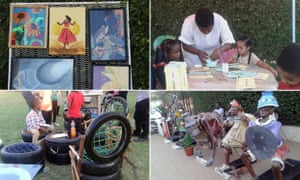
Wamda Yousef sits in front of the baskets and plates she’s made out of newspaper.
“In the beginning, I thought it was difficult to learn, but gradually I learned to do all these artistic shapes only by [using] newspapers that were left by my aunt – she loves reading newspapers,” Yousef says.
“We used to throw them out, but now we have no waste papers at all because I [use] everything at home.”
Yousef, 36, is displaying her work at Khartoum’s first recycling festival, held to encourage people to be creative with their rubbish and keep the city tidy.
About 5,000 tonnes of waste a day is generated in Khartoum state by 6 million people. But only 65% is collected by the authorities.
A lack of resources to pay for rubbish collection has been blamed for the pile-up of waste.Most uncollected rubbish ends up being burned by people fed up with it accumulating in front of their houses. There is no recycling system in Sudan, except among some food factories.
The festival, held in Qureshi Park in February, was organised by five local NGOs and an entrepreneurial organisation. Organisers say about 1,000 people attendedand 30 people – mainly women – showcased the chairs, tables and baskets they had made out of paper, car tyres and plastic bottles.
“We love the environment and want to raise awareness about its importance,” says Maisson Matar, co-founder of the festival and CEO of Fandora (meaning the role of art in the community in Arabic), a project that trains ex-prisoners and others within local communities to make accessories out of recycled paper, plastic and metals.
“We also aim to teach poor people to increase their incomes from their garbage. I was inspired by the Egyptians who held a similar festival in Cairo last year. We do this to make the country better and to help vulnerable people.”
Yousef, who has two children, received support from the Superwoman networkin Khartoum, which supports survivors of gender-based violence. She was introduced to eco-art by Fandora.
“I didn’t sell much in the festival but I believe I can increase my income in the future when people know more about it. It’s a new thing now in Sudan,” she says.
“After we trained women who are victims of violence, we realised that their self-esteem has risen because they feel they are doing good stuff, and they feel valued,” says Matar.
The NGO Ihtimam was one of the groups organising the festival. It provides environmental education for school children and university students, and is also running a campaign to make Khartoum beautiful. Members of the group spent the day asking people how they could make the environment healthier and cleaner.
“We participated in this festival because we are concerned about the environment and we feel responsible towards it,” said Ismail al-Kafi, an agricultural engineer from Ihtimam.
No comments:
Post a Comment